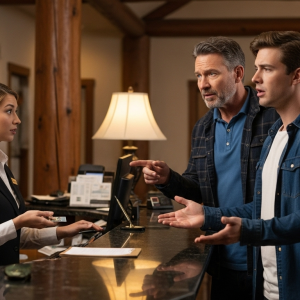The 40th floor of the OmniCorp tower was a realm of polished steel, smoked glass, and profound silence. It was where deals were made and fortunes were tracked on silent, wall-mounted screens. Down in the building’s sprawling, chaotic basement, known affectionately as “The Forge,” was where the future was actually being built. Wires snaked across the ceiling, whiteboards were covered in a cryptic tapestry of algorithms, and the air hummed with the quiet whir of servers and the intense energy of creation.
The Forge was David’s kingdom. As Chief Engineer, he wasn’t just a manager; he was the gravitational center of the company’s genius. He was a quiet, unassuming man in his late thirties, with a mind that moved at the speed of light and a calm demeanor that could soothe the most panicked coder. His team of twelve elite engineers—the architects of OmniCorp’s revolutionary AI project, “Chimera”—didn’t just work for him; they would follow him into a fire.
The 40th floor belonged to Mr. Thompson. The new CEO was a recent import from the world of soft drinks and marketing. He was handsome, charismatic, and wore his ambition like a tailored suit. He saw OmniCorp not as a hub of innovation, but as a collection of assets on a balance sheet. He spoke in buzzwords like “synergy” and “optimization,” and viewed the brilliant, chaotic minds in The Forge as an expensive and unruly resource that needed to be squeezed for maximum quarterly returns.
The conflict began almost immediately. Thompson, poring over marketing projections, saw the colossal potential of Chimera and wanted it on the market immediately. He saw a product, a stock price bump, a personal victory. David, who understood the terrifying complexity of the neural network they had built, saw a catastrophe waiting to happen.
“Rushing a learning AI of this complexity is not just irresponsible; it’s dangerous,” David had warned in a previous meeting, his voice calm but firm. “It needs more time in a sandboxed environment. We could damage the brand beyond repair.”
Thompson had simply waved a dismissive hand. “The market doesn’t wait for ‘perfect,’ David. It rewards ‘first.’ Make it happen.”
That pressure had been building for months. During a late-night work session, fueled by cold pizza and caffeine, David had gathered his core team. He saw the fatigue and frustration in their eyes.
“Listen to me,” he said, his voice low and serious. “What we are building here is revolutionary. It’s ours. We conceived it, we designed it, we bled for it.” He looked at each of them. “Thompson and the board, they see us as employees. Cogs in the machine. But we are the machine.”
“That’s why,” he continued, “I made sure when we filed the core patents for Chimera’s architecture, we did so under our own names as the inventors, with a licensing agreement back to OmniCorp. Always own your work. It’s the only real power you have in this industry.” The team had nodded in agreement, trusting his foresight completely.
Now, the final showdown was set. Thompson had called a mandatory, top-level project review. He wanted a launch date. David knew he couldn’t give him the one he wanted.
The boardroom on the 40th floor felt like a freezer. A long, obsidian table reflected the grim faces of the company’s entire executive leadership: VPs of Sales, Marketing, Finance, and Operations. They were Thompson’s people, men and women who spoke the language of profit and loss, not Python and C++. At the far end of the table sat David, a lone island of technical reality in a sea of corporate fantasy.
Thompson began the meeting with a series of slick, upbeat slides showcasing market projections and potential revenue streams for Project Chimera. The numbers were breathtaking. The room was filled with a palpable sense of greed and excitement.
Then, he turned to David, his smile tight and humorless. “Alright, David. The moment of truth. My team has cleared the path for a Q4 launch. All we need is your team to deliver the product. Confirm for the board that we will be market-ready in six months.”
David didn’t flinch. He calmly opened his laptop and projected his own data onto the screen. It wasn’t a marketing presentation; it was a brutal, honest assessment filled with bug reports, system instability metrics, and the projected failure rates of a rushed launch.
“Mr. Thompson,” David began, his voice steady and professional. “As I have stated in my last four reports, a Q4 launch is not possible if we want to release a stable and safe product. The system’s learning matrix is still exhibiting unpredictable behavior. Releasing it prematurely would be a catastrophic error. We need another eighteen months, minimum.”
The warmth in the room instantly vanished. The executives shifted uncomfortably in their seats. Thompson’s charismatic facade cracked, revealing a deep well of narcissistic rage. He felt disrespected, undermined in front of the board he was supposed to command.
He stood up, planting his hands on the table, his face turning a deep shade of red. He pointed a trembling finger at David.
“I don’t pay you for excuses and delays, David. I pay you for results!” his voice boomed, startling everyone in the room. “I have a board to answer to, and a market to conquer, and you are standing in the way!”
He took a deep breath, his eyes narrowing into slits. He made a decision not as a CEO, but as a bully.
“You know what? I’ve had enough of your negativity. You’re useless to me. You have one minute to collect your personal effects. You’re fired!”
A shocked silence fell over the boardroom. Firing an employee was one thing. Executing your Chief Engineer in the middle of a board meeting, weeks before the most important launch in the company’s history, was an act of corporate insanity.
David stared at Thompson. He didn’t argue. He didn’t plead. He didn’t show a flicker of anger or fear. That unnerving calm seemed to infuriate Thompson even more.
With a slow, deliberate motion, David closed his laptop. He stood up, his chair making a soft scraping sound on the polished floor. He looked his former boss directly in the eye.
“Understood, sir,” he said, his voice devoid of any emotion. “Thank you for the opportunity.”
He turned and walked towards the door, his footsteps echoing in the cavernous silence. Thompson watched him go, a smug, triumphant sneer on his face. He had made his point. He had asserted his dominance.
But the drama was not over.
As David’s hand touched the doorknob, another sound broke the silence. It was the sound of another laptop closing. Maya, David’s brilliant second-in-command and lead architect of Chimera’s neural net, stood up. She didn’t look at Thompson. Her eyes were fixed on David’s back. She gathered her tablet and walked towards the door.
Then another. And another.
Around the room, behind the main executive table, the other key members of the Chimera project who had been called in to observe were also standing up. One by one, in a silent, perfectly synchronized act of solidarity, all twelve core engineers of Project Chimera closed their laptops, pushed back their chairs, and followed their leader out of the room.
They left behind a boardroom filled with stunned, uncomprehending executives. Thompson’s sneer had frozen on his face, his mind unable to process the silent mutiny he had just witnessed. He had cut off the head of the snake, only to find out he had been fighting a hydra
For a moment, Thompson’s arrogance was so profound that he actually chuckled, a harsh, humorless sound. “Well. It seems we need to clean house entirely. Good riddance to them.”
He turned to the bewildered faces of his executive team. “Don’t worry,” he said, trying to project an aura of control. “They’re replaceable. Everyone is replaceable! We’ll hire a new team from India or Eastern Europe for half the cost. People who actually want to work!”
Just as he said the words, the heavy boardroom door burst open.
It was Jessica Riley, the company’s Head of Legal. She was breathless, her face ashen white, and she was clutching a thick legal document as if it were a holy text. Her usual unflappable, corporate composure was gone, replaced by pure, unadulterated panic.
“Thompson! What in God’s name did you just do?!” she gasped, striding into the room. Her eyes were wide with terror.
Thompson was taken aback by her tone. “I just trimmed some dead weight, Jessica. Stay in your lane.”
“This is my lane, you idiot!” she shot back, throwing the document onto the table. It landed with a loud slap that made everyone jump. She jabbed a finger at a highlighted paragraph. “This is the intellectual property licensing agreement for Project Chimera! The agreement between OmniCorp and the patent holders—David Chen and his twelve lead engineers!”
A confused murmur went through the room. Thompson stared at her blankly. “What are you talking about? That technology belongs to the company.”
Jessica let out a hysterical laugh. “No, it doesn’t! We license it from them! And my predecessor, the man you fired last quarter to ‘cut costs,’ allowed them to put in a key person clause!”
She took a deep, shuddering breath, her voice trembling with rage and disbelief as she explained the catastrophic reality.
“The clause explicitly states that the entire licensing agreement remains valid only so long as David Chen is employed by OmniCorp in a leadership capacity. It says, and I quote, ‘Should the employment of the Key Person, David Chen, be terminated for any reason, this licensing agreement shall be rendered immediately null and void.’”
She looked around at the horrified faces of the board members.
“You didn’t just fire an employee, Thompson,” she whispered, the words hanging like a death sentence in the air. “You just legally and irrevocably signed away our company’s entire future. We no longer have the right to use our own core technology.”
The smug, arrogant mask on Thompson’s face finally crumbled, replaced by a ghastly, sickening realization. The blood drained from his face, leaving him looking like a ghost in his expensive suit. The billion-dollar project, the soaring stock price, his legacy—it had all been a house of cards, and he had personally set it on fire.
The other executives were frozen in a state of collective shock, staring at Thompson as if he were a man who had just jumped from a plane without a parachute.
And then, a new sound entered the room.
It was the soft, insistent buzz of a cellphone on the table. Then another. And another. In seconds, every phone in the boardroom was vibrating, lighting up with the same breaking news alert from a major tech publication.
The VP of Marketing was the first to read his screen. His eyes went wide, and he let out a low groan, dropping his head into his hands.
The headline was a dagger to the heart of OmniCorp.
“GOOGLE ACQUI-HIRES ENTIRE ‘PROJECT CHIMERA’ AI TEAM FROM OMNICORP. DEAL INCLUDES EXCLUSIVE LICENSING TO ALL ASSOCIATED PATENTS.”
The story was all there. A major competitor had been circling, aware of the internal turmoil. The moment David and his team walked out of the building, a pre-negotiated, multi-hundred-million-dollar deal was triggered. They hadn’t just been hired; they and their intellectual property had been acquired wholesale.
OmniCorp was now nothing more than an empty shell. Its revolutionary technology, its entire R&D department, and its future were now the property of its biggest rival. Thompson had not just fired his best employee; he had handed his enemy the keys to the kingdom.
The next day, OmniCorp’s stock opened by plummeting 85%. The board convened an emergency meeting and summarily fired Mr. Thompson, his disgrace absolute and public. The company he had tried to mold in his own image was now facing bankruptcy and irrelevance.
Miles away, in a sleek, sun-drenched office on the Google campus, there was a different kind of meeting taking place.
David and his twelve engineers stood surrounded by state-of-the-art equipment, unlimited resources, and a palpable atmosphere of creative freedom. A bottle of champagne was popped, the cork ricocheting off the high ceiling.
They had been given their own division, complete autonomy, and a budget that dwarfed their wildest dreams at OmniCorp. They were no longer cogs in a machine; they were the masters of their own destiny, tasked with changing the world on their own terms.
Maya raised her glass. “To David,” she said, her voice filled with respect and admiration. “Who saw the storm coming and built us all an ark.”
The team cheered, their faces bright with relief and excitement.
David smiled, a genuine, relaxed smile they hadn’t seen in months. He looked out the floor-to-ceiling window at the sprawling campus, a world of infinite possibility. He thought of Thompson, of the sterile boardroom, of the final, arrogant insult.
He raised his own glass. “To Mr. Thompson,” he said, a glint of humor in his eyes. “For giving us the greatest promotion of our lives.”
He hadn’t just walked away from a job. He had taken the soul of the company with him, leaving behind nothing but an empty suit on the 40th floor.




